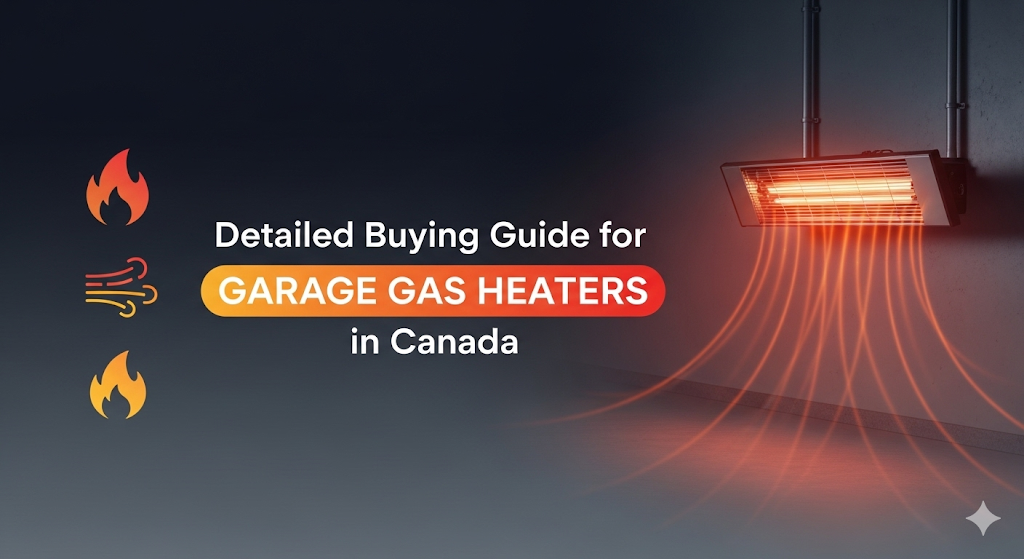Introduction:
Why You Need a Detailed Buying Guide for Garage Gas Heaters
Canadian winters are no joke. The garage, often the coldest part of your home, becomes unusable when temperatures dip far below freezing. Whether you use your garage as a workshop, gym, or storage space, the right heating solution is essential. That’s where our Detailed Buying Guide for Garage Gas Heaters comes in.
This guide will help you understand the different types of heaters, their costs, installation requirements, safety considerations, and energy efficiency tips—so you can choose the best option for your space. GM HEATING AND COOLING INC, a trusted Canadian HVAC provider, specializes in installing reliable, efficient heating systems designed to keep your garage warm and safe all winter long.
Why Choose a Garage Gas Heater?
A garage gas heater is designed specifically to tackle the challenges of large, drafty, and poorly insulated spaces. Unlike electric heaters, gas models deliver more consistent, powerful heat and are often more cost-effective in the long run.
Key benefits include:
- High efficiency – Heats large areas quickly.
- Lower operational costs – Natural gas or propane is usually cheaper than electricity.
- Long-term durability – Built to withstand rugged garage conditions.
- Customizable size – Models are available to fit single, double, or oversized garages.
If you’re tired of working in an ice-cold garage, our Detailed Buying Guide for Garage Gas Heaters will walk you through all the key factors to consider.
Types of Garage Gas Heaters
Choosing the right type is the first step in this Detailed Buying Guide for Garage Gas Heaters. Here are the most common options:
1. Forced-Air Garage Gas Heaters
- Works like a mini furnace by blowing hot air through a fan.
- Ideal for quickly heating larger garages.
- Best for workshops where warm air circulation is needed.
2. Radiant Garage Gas Heaters
- Emits infrared heat that warms objects and people directly.
- Energy-efficient for targeted heating.
- Perfect for garages used intermittently, such as hobby spaces.
3. Natural Gas Garage Heaters
- Runs on your home’s natural gas line.
- Low operating costs for Canadian households with gas supply.
- Reliable and powerful for long-term heating.
4. Propane Garage Heaters
- Great for rural homes without natural gas access.
- Portable and flexible.
- Slightly higher fuel costs but good for off-grid use.
Sizing Your Heater: BTUs Explained
One of the most important decisions in this Detailed Buying Guide for Garage Gas Heaters is choosing the right BTU rating.
- Single-car garage (200–400 sq. ft): 15,000–25,000 BTUs
- Two-car garage (400–800 sq. ft): 30,000–50,000 BTUs
- Oversized garage (800–1,200+ sq. ft): 60,000+ BTUs
Tip: Factor in insulation. Poorly insulated garages may require 20–30% more BTUs. GM HEATING AND COOLING INC can perform a professional heat load calculation to ensure you don’t under- or overspend on heating capacity.
Features to Look for in a Garage Gas Heater
This Detailed Buying Guide for Garage Gas Heaters wouldn’t be complete without a breakdown of must-have features:
- Thermostat Control – Digital models allow set-and-forget convenience.
- Safety Sensors – Automatic shutoff for overheating or oxygen depletion.
- Quiet Operation – Important if your garage doubles as a workspace.
- Ventilation Options – Direct-vent models ensure safe operation indoors.
- Energy Efficiency Ratings – Look for Energy Star–certified units when possible.
Costs: What You Can Expect to Spend
Price is a major factor in this Detailed Buying Guide for Garage Gas Heaters. Here’s what Canadians typically pay:
- Budget-Friendly Units ($250–$500): Basic, portable propane heaters for small garages.
- Mid-Range Units ($500–$1,200): Wall- or ceiling-mounted models with digital thermostats and strong safety features.
- High-End Units ($1,200–$3,000): Professional-grade, energy-efficient systems with smart controls and quiet performance.
Installation Costs: Expect $500–$1,000 for professional installation, depending on gas line access, venting, and electrical work.
GM HEATING AND COOLING INC provides transparent quotes and ensures your installation meets all Canadian safety standards.
Professional Installation: Why It Matters
DIY may sound tempting, but connecting to a gas line and venting exhaust safely requires expertise. In this Detailed Buying Guide for Garage Gas Heaters, we strongly recommend professional installation.
Benefits of hiring experts like GM HEATING AND COOLING INC:
- Correct venting to avoid carbon monoxide risks.
- Compliance with local codes and safety standards.
- Proper sizing and placement for maximum efficiency.
- Long-term warranty protection.
Safety Considerations
Safety is a core part of this Detailed Buying Guide for Garage Gas Heaters. Gas heaters are safe when installed properly, but you must follow precautions:
- Install Carbon Monoxide Detectors in your garage and nearby rooms.
- Maintain a clear zone of at least three feet around the heater.
- Check ventilation regularly for blockages.
- Turn off the heater when leaving the garage unattended.
Energy Efficiency and Rebates in Canada
Energy efficiency is becoming a bigger priority for Canadian homeowners. Many provinces and utility providers offer rebates for energy-efficient garage gas heaters.
Check programs such as:
- Canada Greener Homes Grant
- Provincial rebate programs (Ontario, BC, Alberta, etc.)
- Utility incentives from local gas providers
GM HEATING AND COOLING INC can help homeowners identify available rebates and recommend the most cost-effective models.
Maintenance Tips for Longevity
To ensure your investment lasts, this Detailed Buying Guide for Garage Gas Heaters recommends:
- Annual inspection by a certified HVAC technician.
- Cleaning or replacing filters regularly.
- Keeping vents free from snow, ice, or debris.
- Monitoring for unusual noises or yellow pilot lights.
- Lubricating moving parts as recommended by manufacturers.
Conclusion:
Make the Smart Choice with GM HEATING AND COOLING INC
Canadian winters demand reliable garage heating solutions. With this Detailed Buying Guide for Garage Gas Heaters, you now understand the types, costs, features, safety considerations, and rebates available.
Whether you need a budget-friendly model or a high-end professional installation, GM HEATING AND COOLING INC is here to provide expert advice, installation, and maintenance services. Don’t let the cold limit how you use your garage—turn it into a warm, functional space today.
FAQs – Detailed Buying Guide for Garage Gas Heaters
1. How much does it cost to install a garage gas heater in Canada?
Installation costs typically range from $500–$1,000, depending on your garage setup and gas line access.
2. What size garage gas heater do I need?
Most two-car garages require 30,000–50,000 BTUs, but insulation and climate also affect sizing.
3. Are garage gas heaters energy efficient?
Yes, modern units are designed for efficiency, and many qualify for provincial or federal rebates.
4. Is professional installation necessary?
Yes. Gas connections and venting should always be handled by certified HVAC professionals for safety.
5. Can I run a garage gas heater all day?
You can, but it’s recommended to use a thermostat and carbon monoxide detector for safe operation.


